Erstellt am: 9. 12. 2015 - 20:05 Uhr
"Will our children be able to live at all?”
Time is ticking away as negotiators in Paris at the climate summit COP21 make a final push for what could be an historic agreement on tackling global warming.
Today was billed as a “decisive day” - a stepping stone to a global consensus. But did it live up to the hype?
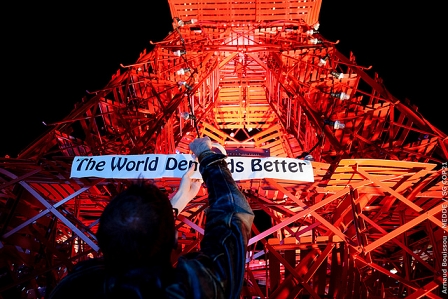
COP21
After a couple of hours delay, a new slimmed down draft was presented at just after 3pm by COP21 president Laurent Fabius. It had been whittled down from 43 pages to ‘just’ 29, with the more open ended-options now streamlined.
Yet there are several ‘ifs’ and ‘buts’ and Fabius, who is also warned negotiators to expect to work through most the night and be prepared to cede ground.
Rich vs. Poor
Here's the contentious issue: Many countries in the developing world feel that the rich West is asking them to forgo the chance to go down the same lucrative carbon-intensive we went down, lining our pockets as we dirtied the sky.
Is that fair?
The divide between the developed and developing countries has traditionally been a barrier at these climate conferences and was the ruination of COP15 in Copenhagen 6 years ago.
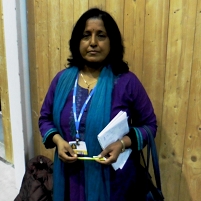
chris cummins
Much of it stems from the concept of “historical responsibility”, by which the developing countries mean that the countries that jumped ahead economically on the back of early industrialized should take the first and most robust steps to tackle a man-made global warming problem that they largely created.
"Shifting the repsonsibility"
“The developed world is promising to do far too little to reduce its emissions,” Meena Raman of Friends of the Earth told me. “The rich world lived in in an unconstrained carbon-era. If they don’t want the developing world to repeat that path, they need to offer much more and not just shift the responsibility to the poor countries.”
Dieses Element ist nicht mehr verfügbar
There was acknowledgement of that principle in a key speech from US Secretary of State John Kerry today:
“The United States has long supported the notion of common but differentiated responsibilities and respective capabilities, with each of us doing to best we can” he said, in an address he clearly hoped would appease miffed developing countries. “It is only fair to have higher expectations of developed countries and a sliding scale of ambitions and approaches for everybody else.”
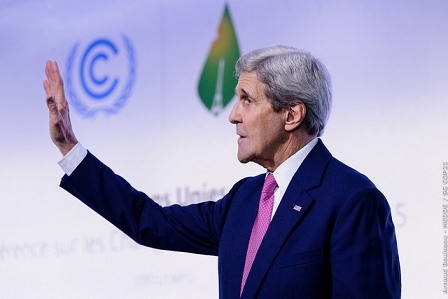
COP21
But he went on to reiterate that the USA needed “to know that everybody is also being held to the same system. “ He said no one country “can solve this problem or foot the bill alone. That’s not rhetoric, that’s just plain fact.” While emissions in the West are stabilizing, they are still growing fast in the developed world.”
Is South Korea a developing country?
The USA is keen to differentiate between the developing world and the countries listed as developing at a climate conference in 1992, but which are now emerging powers with heavy carbon footprints. Not just China, but also Saudi Arabia and South Korea are on that list. But the developing world bloc has seen this objection as a tactic akin to divide and conquer.
It's about "climate justice"
French President Francois Hollande addressed the dangerous divide in his opening speech at the conference when he re-iterated that the conference here in Le Bourget, Paris is about “climate justice”. That’s a nod to Indian Prime Minister Narendra Modi, says Sara Stefanini of Politico.eu, who has been observing these talks from day one.
Dieses Element ist nicht mehr verfügbar
“India is in an interesting position,” she says. India is a fast growing economy with a large poverty problem. It has a thirst for cheap energy to fuel its growth and help people improve their living standards: “I think it is afraid of being required to reduce its emissions, because it has a lot of coal, without getting the financing and technical support it needs to make the transition,” says Stefanini.
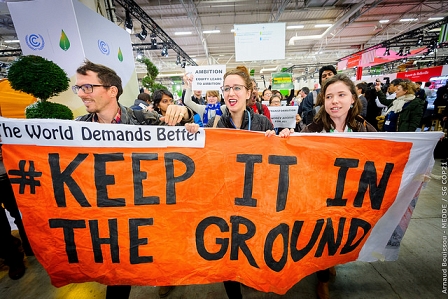
COP21
Some goodwill was created yesterday when the EU promised to pay 475 million euros to support climate action in the partner countries in the developing countries up to 2020. Speaking today John Kerry announced the US has promised to double to $861m aid to countries on the frontline of climate change.
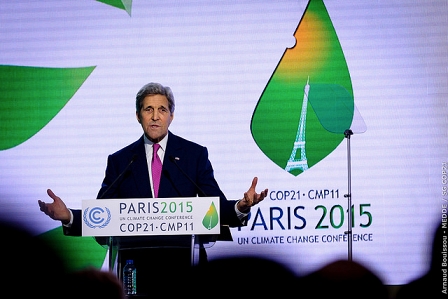
COP21
He also had this message:
“I know at first blush it seems difficult to rationalise investing in clean energy when your economy is already strained and when you have tens or even hundreds of millions of people in poverty. It can seem that coil and oil are cheaper and closer at hand in the short term. But in the long term carbon intensive energy is one of the costliest investments any government to make.”
Dieses Element ist nicht mehr verfügbar
He went on to list the billion dollar bills the US faces due to climate damage, including loss of agriculture, the devastation of extreme weather and the public health impact of pollution.
The environmental pressure group Greenpeace was less than impressed with the rhetoric or the draft bill which they say contains “wishy-washy language” instead of setting a tight deadline of 2050 to phase out carbon emissions.

Barbara Köppel
Outside the negotiating hall the campaigners had brought a two story-high roaring mechanical polar bear called Aurora to draw attention to their calls for a strong binding agreement: As Aurora roared FI met the head of Greenpeace Kumi Naidoo:
Dieses Element ist nicht mehr verfügbar
“If we lock ourselves into a low ambition level at these talks we will see an orgy of fossil fuel burning happening and that is something we simply can’t afford.”
I asked him whether he expected to get a deal on Friday that he could live with? “It is not about what I can live with or what Greenpeace can live with. The question is: will be whether our children will be able to live at all.”
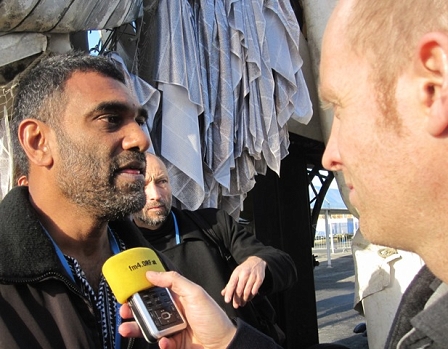
Barbara Köppel
But he said irrespective of what is decided in this airy colossus of a conference centre, come the 12th of December the fight goes on: “There is a momentum across the world. The struggle will continue. We are going to mobilize the largest possible resistance to our governments dragging their feet.”


